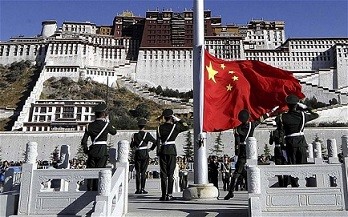China will be joining the celebration for the 50th anniversary of the establishment of the Tibet Autonomous Region, as the government pledged to preserve national integrity and safeguard long-term peaceful governance in the region, the Global Times reported.
Teng Tingguo, deputy head of the press section at the regional publicity department, said on Monday, Aug.31, that China's top leaders are invited to deliver messages for the upcoming celebrations this week, which will also feature a gala show.
The report said that since April, a series of events for the anniversary have been held, including art exhibitions and the release of a documentary.
The government is also set to release a commemorative stamp set for the anniversary of Tibet, as well as a musical featuring the Qinghai-Tibet Railway, the world's highest plateau railway.
Established on Sept. 1, 1965, the Tibet Autonomous Region was the last provincial-level region established within the People's Republic of China.
Last week, the 6th Tibet Work Forum was held in Beijing, aimed at further evaluating the country's Tibet policy. During the forum, President Xi Jinping urged that the country's policy on Tibet should focus on maintaining national integrity and battling separatism, adding that it will ensure long-term peaceful governance and sustainable growth, as well as improved unity in the region.
Analysts said that the meeting had set the basic tone of policy for the next five years, adding new touches to old policies, such as "enforcing the rule of law in Tibet," "sustainable growth" and "improving social cohesion."
"Enhancing social cohesion and an emphasis on a more human-centric approach is being put forward amid increasing conflicts caused by the economy-centered development," Xiong Kunxin, an ethnic studies professor at the Minzu University of China, told the Global Times.
Xinhua reported on Aug.26 that Tibet's GDP rose from 3.7 billion yuan ($580,160 million) to 92 billion yuan, from 1993 to 2014, and farmers and herdsmen earn an average income of 7,471 yuan, 10.6 times that of 1993.
Xi stressed during the forum that the country should take the initiative in the fight against separatism, as he urged local residents to participate in the development of the region.



























